Recruiting the right talent is crucial for any organization’s success, but the recruitment process can be time-consuming and challenging without the right tools. Recruitment software helps streamline the hiring process, from sourcing candidates to managing interviews, onboarding, and beyond. This article explores the Top 10 Recruiting Software in 2024, offering insights into their features, pricing, availability of free trials, and the pros and cons to help you make an informed decision.
For businesses also looking to manage team time-off and employee scheduling, tools like Day Off can complement your CRM system by enhancing team organization.
1. Greenhouse
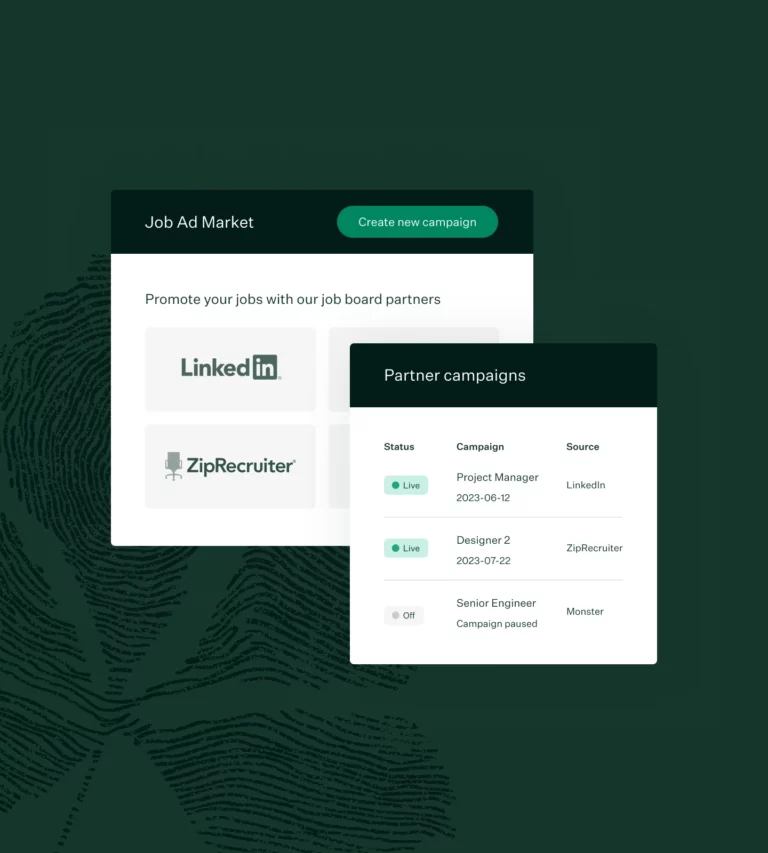
Greenhouse is a leading recruiting software known for its structured hiring process. It’s particularly popular among mid-sized and large companies due to its focus on data-driven recruiting, making it easy to manage complex hiring needs. Greenhouse emphasizes creating a collaborative hiring environment with customizable workflows and robust analytics.
Customization
Analytics
Integration
Companies must contact their sales team for a tailored quote • Trial: Yes • Free Plan: No.
Pros
Highly customizable workflows: Greenhouse enables companies to design detailed hiring processes suited to their specific requirements, from creating custom pipelines to setting specific evaluation criteria.
Robust analytics and reporting features: Offers in-depth analytics that allow for tracking recruitment metrics, helping companies optimize their hiring strategies based on data.
Great integration with third-party apps: Integrates seamlessly with other HR tools, such as job boards and communication platforms, facilitating a unified recruitment process.
Intuitive user interface: The platform’s clean design and easy-to-navigate dashboard make it accessible for both experienced recruiters and new users.
Cons
Expensive for small businesses: Pricing may be too high for smaller organizations, making it more suited for larger companies with bigger budgets.
Requires a learning curve to master all features: The wide array of features may be overwhelming initially, requiring training for full utilization.
Limited automation features without add-ons: Some automation capabilities are restricted unless integrated with additional software, potentially increasing costs.
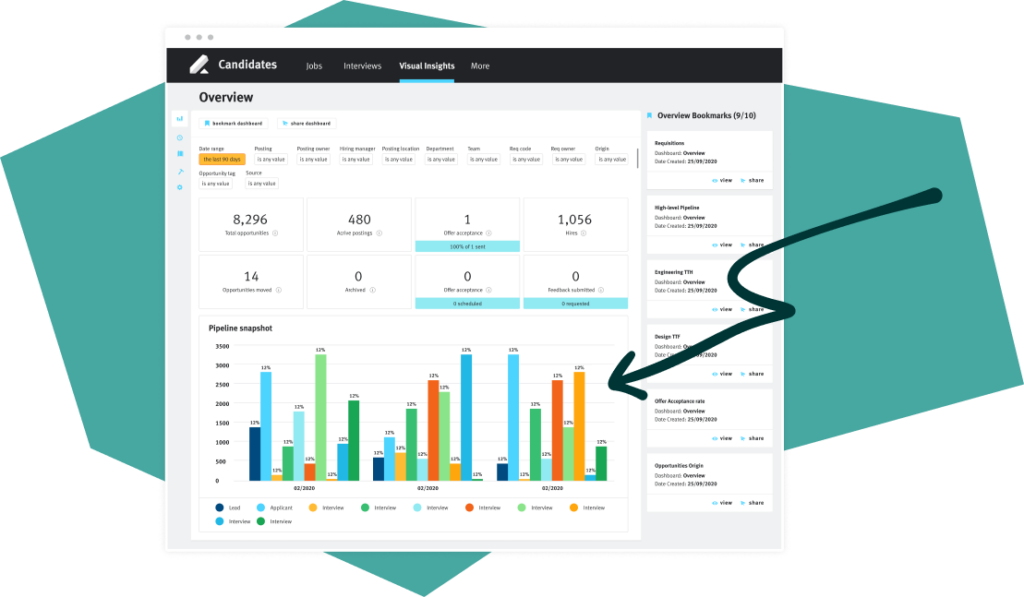
Lever is a modern recruiting software that combines applicant tracking with candidate relationship management (CRM). Its strength lies in fostering collaborative hiring processes, making it easier for HR teams to work together on finding the right candidates.
Collaboration
CRM
Analytics
You'll need to reach out to their sales team for a quote. • Trial: Yes • Free Plan: No.
Pros
Excellent candidate relationship management (CRM): Allows recruiters to maintain long-term relationships with potential candidates, building a talent pool for future opportunities.
Great user interface with intuitive design: Easy to navigate with drag-and-drop functionality, making it ideal for quick pipeline adjustments and candidate tracking.
Strong analytics for recruitment insights: Provides detailed metrics such as source of hire, time-to-fill, and candidate pipeline, aiding data-driven decision-making.
Easy collaboration tools for team-based hiring: Facilitates teamwork through shared notes, candidate feedback, and scheduling tools, improving the efficiency of hiring decisions.
Cons
Expensive for small companies: Advanced features come at a higher cost, potentially pricing out smaller organizations.
Limited customization in standard packages: Customization options are more accessible in higher-tier plans, limiting flexibility for smaller businesses.
Can be slow when processing large amounts of data: Occasionally lags with extensive candidate databases, impacting performance during high-volume hiring.
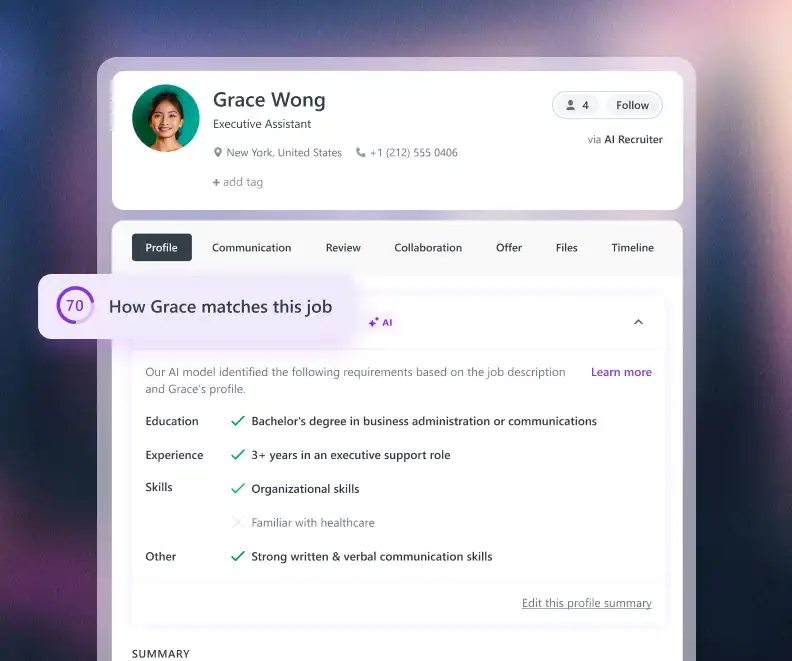
Workable is an all-in-one recruiting software designed to simplify the hiring process for businesses of all sizes. It stands out for its AI-driven candidate sourcing and comprehensive job posting capabilities, making it easy to attract qualified candidates.
Automation
Simplicity
Sourcing
$99 per job per month for pay-as-you-go. Custom pricing is available for larger enterprises. • Trial: Yes • Free Plan: No.
Pros
AI-driven candidate sourcing: Automatically identifies and sources candidates from databases and job boards, reducing manual search time.
Intuitive and clean interface: A user-friendly design that requires minimal training, allowing teams to get started quickly.
Comprehensive job posting capabilities: Posts job listings across multiple platforms, reaching a larger candidate pool with minimal effort.
Automated workflows: Customizable workflows automate routine tasks like follow-up emails and interview scheduling, saving recruiters’ time.
Cons
Pay-per-job pricing can be costly: Hiring for multiple roles simultaneously can become expensive, especially for companies with high turnover.
Limited customization options for lower-tier plans: Some advanced features require upgrading to higher tiers, limiting flexibility for budget-conscious companies.
Customer support can be slow to respond: Some users report delays in getting timely support, which may be challenging during critical hiring phases.
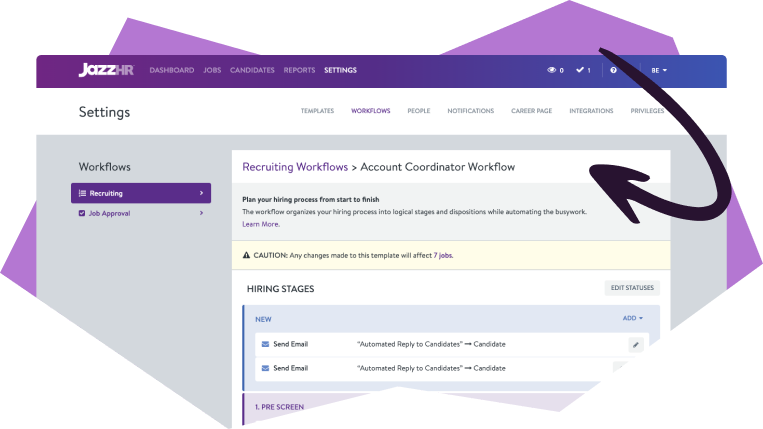
JazzHR is a popular choice for small to mid-sized businesses seeking an affordable and user-friendly recruitment platform. It offers a streamlined process for job posting, candidate tracking, and interviewing, with a focus on simplicity and ease of use.
Affordability
Ease
Job-Boarding
$39 / Month - $359 maximum • Trial: Yes • Free Plan: No.
Pros
Affordable pricing for small businesses: Budget-friendly plans make it an accessible choice for smaller companies with limited resources.
Easy to set up and use: The interface is simple, reducing the learning curve for new users, and making it ideal for teams who want quick implementation.
Great job board integration: Integrates with numerous job boards, enabling easy distribution of job ads across platforms, and maximizing candidate reach.
Customizable interview guides: Users can create tailored interview templates, ensuring a consistent and fair process for all candidates.
Cons
Limited features in lower-tier plans: Some key functionalities like automation and reporting are only available in higher-priced plans, limiting flexibility for lower budgets.
Outdated user interface design: The design feels dated compared to other platforms, which can impact the overall user experience.
No native video interviewing tools: Requires third-party tools for video interviews, lacking built-in capabilities that other platforms offer.
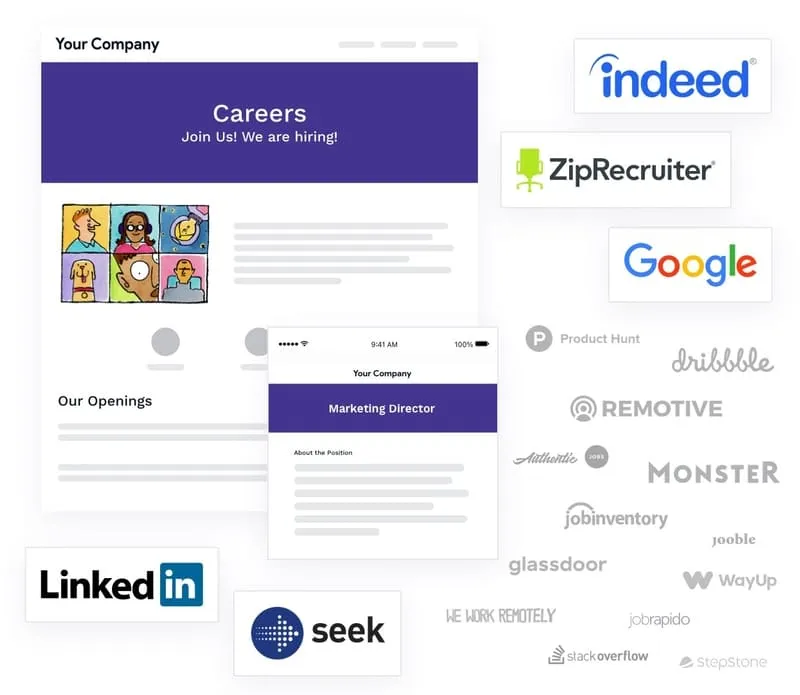
Breezy HR is known for its intuitive and visually appealing design, catering to small and medium-sized businesses. It’s praised for its drag-and-drop interface and built-in messaging, offering a streamlined approach to managing the hiring process.
Visual
Scheduling
Messaging
$157 / Month - $439 maximum • Trial: Yes • Free Plan: Yes
Pros
Drag-and-drop candidate management: Offers a simple yet effective way to move candidates through hiring stages, making the process highly visual and straightforward.
Built-in messaging and video interviewing: Integrates communication tools directly into the platform, allowing seamless interactions with candidates.
Easy-to-use reporting and analytics: Provides clear, understandable data on recruitment performance, helping to identify areas for improvement.
Automated job posting: Allows recruiters to post jobs to multiple boards with a single click, saving significant time in the posting process.
Cons
Limited features in the free plan: The free version only supports basic recruiting for a single position, not suitable for companies with larger hiring needs.
Pricing can increase quickly with add-ons: Costs can escalate with additional features, impacting companies on tight budgets.
Not ideal for large enterprises: Lacks some advanced capabilities needed for complex hiring processes in larger organizations.
Zoho Recruit is a comprehensive ATS (Applicant Tracking System) and recruiting software designed to support small to medium-sized businesses as well as staffing agencies. It offers features like resume parsing, candidate tracking, interview scheduling, and job posting across multiple job boards. Zoho Recruit is part of the Zoho ecosystem, making it ideal for companies already using Zoho’s other business tools.
Integration
Customization
Affordability
$30 User / Month - $90 maximum • Trial: Yes • Free Plan: Yes.
Pros
Integration with the Zoho ecosystem: Zoho Recruit integrates smoothly with other Zoho products like Zoho CRM, which is beneficial for companies already using Zoho’s suite of business tools.
Extensive customization options: Offers the ability to customize fields, forms, and workflows to suit the specific needs of the business, making it adaptable to different recruitment scenarios.
Built-in AI-powered features: Uses AI to match candidates to job requirements, saving recruiters time in screening and shortlisting potential hires.
Affordable for small businesses: The pricing structure is competitive, especially with the availability of a free plan, making it accessible to startups and small businesses.
Cons
Limited features in the free plan: While there is a free version, it lacks many of the advanced functionalities needed for more complex recruitment needs.
Can feel complex for beginners: The software offers many features, which can be overwhelming for users new to ATS platforms, requiring some time to learn.
Customer support can be inconsistent: Some users have reported slower response times with customer support, which may be a concern during critical hiring periods.
Top 10 Absence Management Software
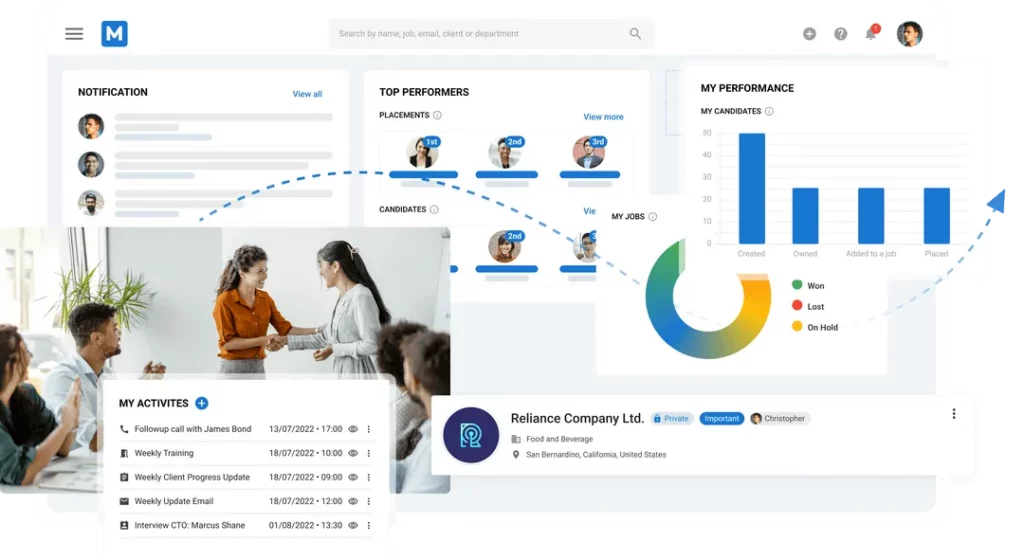
AI
Simplicity
Social
Manatal is a cloud-based recruiting software designed to streamline the hiring process for small to medium-sized businesses and recruitment agencies. Known for its simplicity and powerful AI-driven features, Manatal helps recruiters manage candidate pipelines, automate workflows, and improve hiring efficiency. With an intuitive interface and advanced candidate sourcing tools, Manatal is a strong choice for companies looking to modernize their recruitment process without the complexity often found in other ATS platforms.
$15 User / Month - $55 maximum • Trial: Yes • Free Plan: No.
Pros
AI-powered candidate recommendations: Manatal’s AI-driven engine automatically matches candidates to job descriptions, helping recruiters identify the best fit for a role. This saves time and ensures higher-quality matches, leading to a more efficient hiring process.
Social media enrichment: The software pulls information from candidates’ LinkedIn and other social media profiles, providing a fuller picture of the applicant’s background and skills. This is especially helpful for passive candidate sourcing.
User-friendly and intuitive interface: Manatal is known for its clean, minimalistic design that makes it easy to navigate, even for beginners. This reduces training time and ensures teams can use the software effectively right away.
Customization of recruitment pipelines: Users can easily create and modify custom pipelines for different job roles, allowing recruiters to tailor the process according to the specific needs of each position.
Cons
Limited integrations: Compared to some of the larger platforms, Manatal has fewer integrations with third-party apps, which might limit its functionality if you rely on other specialized HR tools.
No native CRM features: While Manatal excels as an ATS, it lacks comprehensive CRM functionalities, which may be a drawback for recruiters who want to manage long-term candidate relationships within the same platform.
Limited reporting features: The reporting capabilities, while functional, are not as advanced as those found in more enterprise-level ATS platforms, making it less suitable for companies that require deep analytics and reporting.
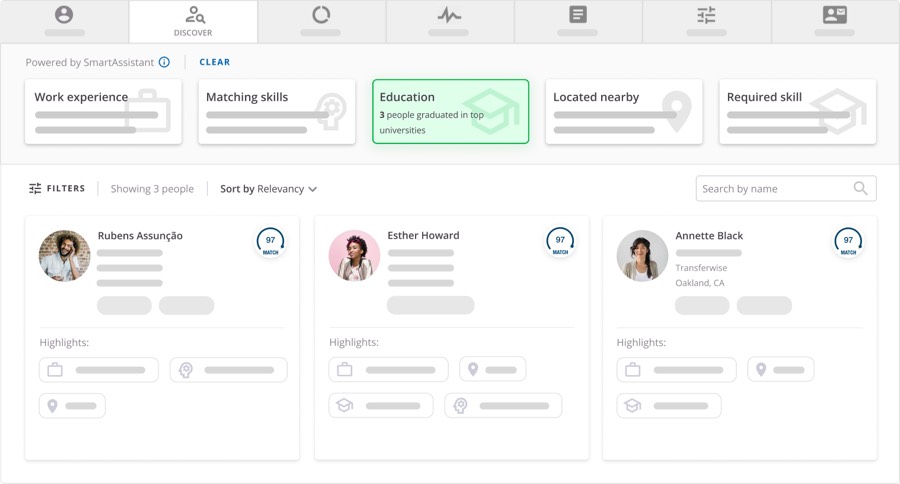
SmartRecruiters is a comprehensive recruiting software designed for companies of all sizes, focusing on delivering a great candidate experience. It’s widely used by global enterprises due to its scalability and collaborative hiring features.
Scalability
Integration
Mobile
Custom-based and requires contact with their sales team for a tailored quote • Trial: No • Free Plan: No.
Pros
User-friendly interface: Simple and intuitive, allowing HR teams to manage multiple candidates easily.
Excellent integration options: Connects with numerous HR and job board platforms, enabling a seamless recruitment process.
Robust candidate management: Provides detailed tracking and management of candidates from initial contact to final hiring, keeping everything organized.
Mobile-friendly: The mobile app allows recruiters to manage hiring on the go, improving flexibility and response time.
Cons
Can be pricey for smaller businesses: Higher-tier functionalities can be expensive, making it more suitable for larger companies.
Occasional bugs reported: Some users have reported glitches in the system, though these are typically resolved quickly.
Customization options can be complex: Customizing workflows may require technical assistance, which could slow down the initial setup.

Jobvite is an end-to-end recruiting software designed to simplify the hiring process, with a focus on automation and candidate experience. It’s particularly popular with mid-sized companies that value efficiency and data-driven recruiting.
Automation
Social
CRM
Custom pricing based on company needs • Trial: Yes • Free Plan: No.
Pros
Strong emphasis on automation: Automates repetitive tasks like email follow-ups, scheduling, and initial screenings, saving recruiters a lot of manual work.
Great analytics and reporting tools: Offers detailed reports on key metrics, helping businesses optimize their recruitment strategy.
Advanced CRM functionalities: Jobvite’s CRM features help build a strong talent pipeline, maintaining ongoing relationships with potential candidates.
Excellent social media integration: Integrates well with social platforms for sourcing and posting job ads, expanding reach to diverse candidate pools.
Cons
The user interface could be more intuitive: The layout can feel cluttered, especially for new users, which may increase the learning curve.
Can be costly for small businesses: Pricing tends to favor mid-to-large enterprises, making it potentially expensive for startups.
Occasional technical support delays: Some users have mentioned slow response times from customer support during high-demand periods.
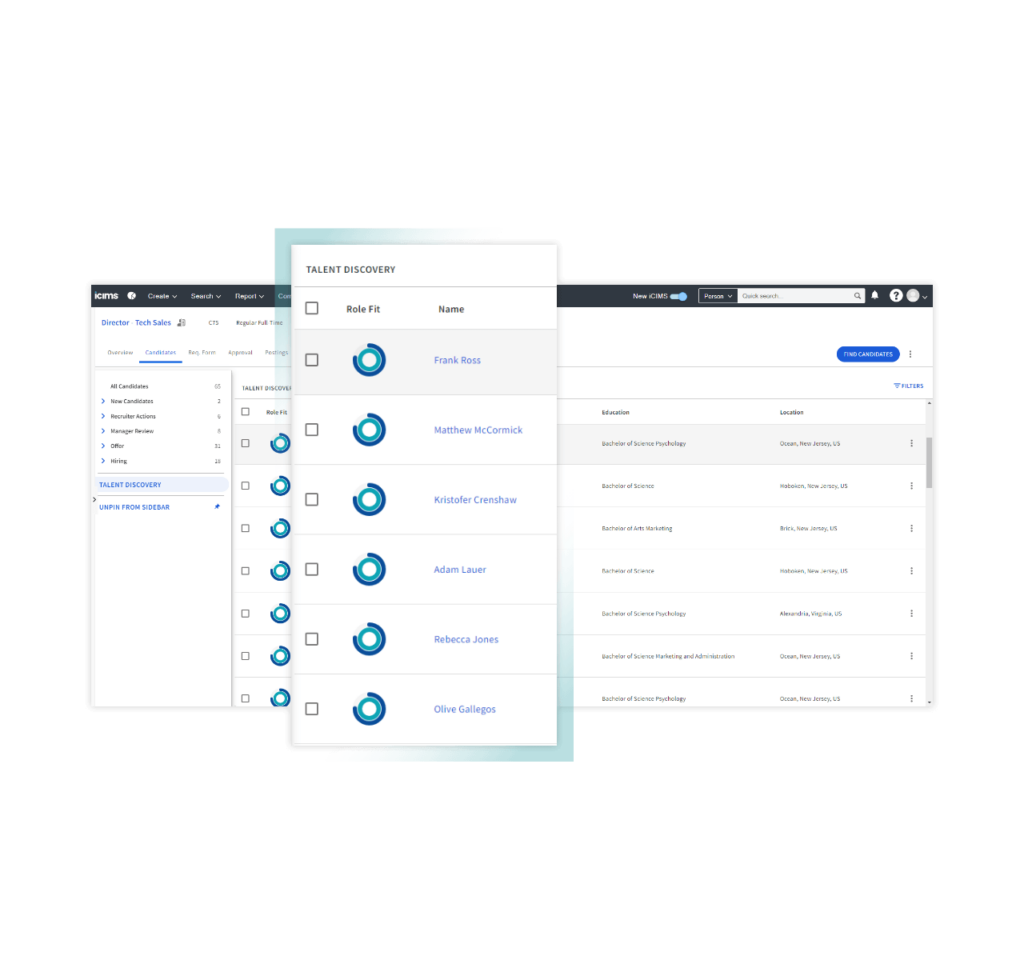
iCIMS is a well-established recruiting software tailored for enterprises, focusing on providing scalable solutions that integrate well with existing HR systems. It offers a range of features from sourcing to onboarding, making it a comprehensive choice for large organizations.
Enterprise
Onboarding
Reporting
Custom pricing based on company requirements • Trial: Yes • Free Plan: No.
Pros
Scalable for enterprise use: Designed for large-scale recruiting, with features that accommodate high-volume hiring needs.
Strong integration capabilities: Connects seamlessly with major HR systems, facilitating data flow and reducing redundancy.
Comprehensive reporting and analytics: Offers in-depth insights into recruitment performance, with customizable reports and dashboards.
Robust onboarding features: Provides a smooth transition from candidate to employee, making onboarding easier and more efficient.
Cons
Steeper learning curve: iCIMS is feature-rich, which can make it overwhelming for new users or smaller teams without training.
Can be expensive: Pricing is on the higher side, catering to enterprises rather than small businesses or startups.
Limited flexibility for small-scale operations: Better suited for large organizations; smaller teams might find it more than they need.